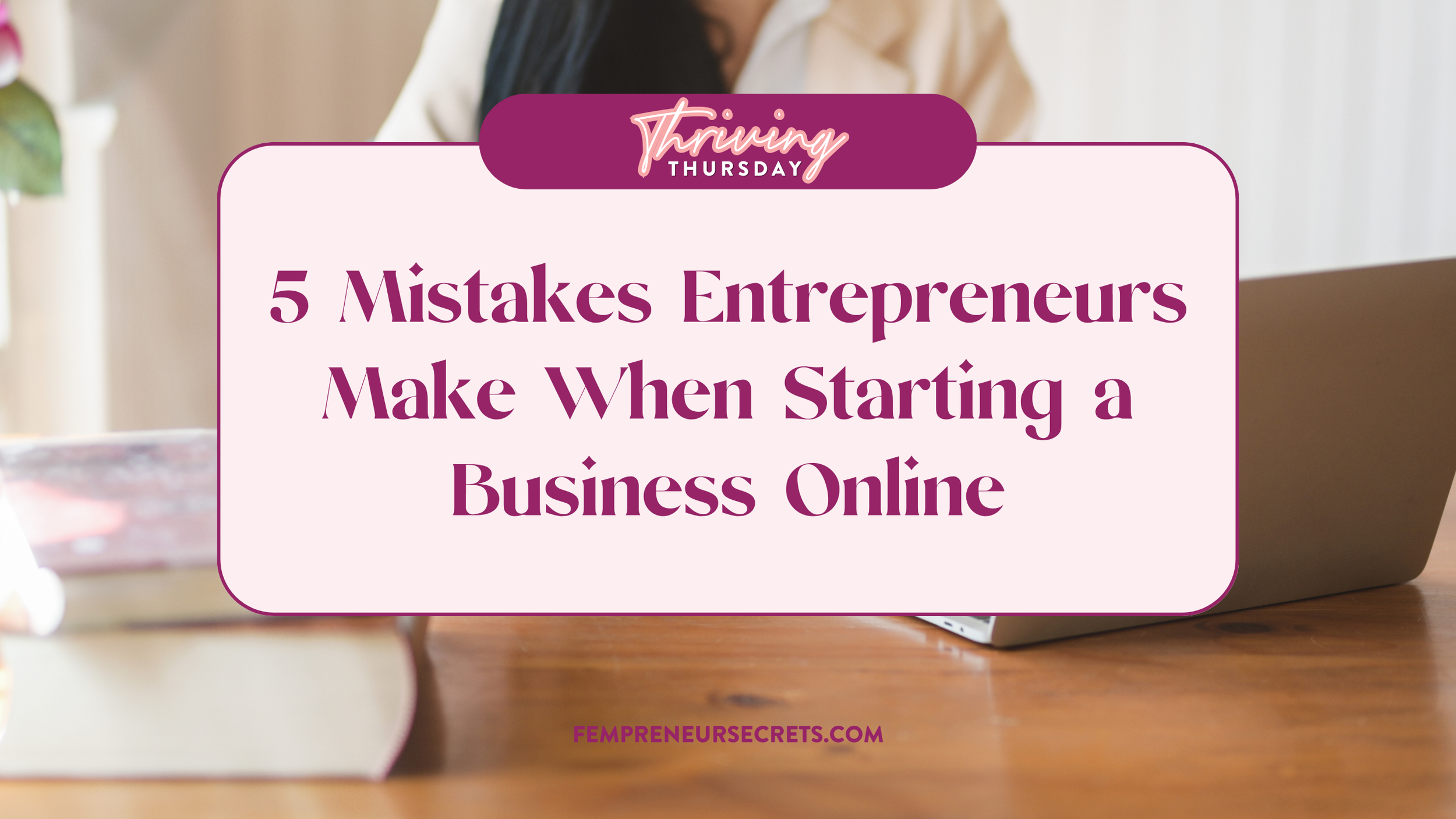S1E20: Sponsorship vs Collaboration
How do you tell if someone is asking you for a collaboration, or a sponsorship? Do they use the words loosely, or are they using the words as they are meant to be? In this episode, we’ll cover this topic in-depth.
Listen to the Episode below:
In this episode, you'll hear about:
4 Types of Sponsorships
3 Types of Collaborations
How & When to get involved in a collaboration
Welcome to Fempreneur Secrets where business secrets are revealed. Today's episode was inspired by a listener, and she wanted to know what's the difference between collaboration and sponsorship? How do you tell if someone is asking you for a collaboration, or a sponsorship? Do they use the words loosely, or are they using the words as they are meant to be?
Let's start off this episode with a quote:
"A candle never loses any of its light by lighting another." — Rachel Allene
I want to start off by saying that not all opportunities are good opportunities. I don't mean to burst your bubble, but the truth of the day is that you have to be cautious as to what type of sponsorship, or collaborations you choose for your business.
Definitions
The definition of sponsorship in the English dictionary is:
"Being in a position to receive funds for an activity, program, or project.
And definition for collaboration it is,
"A working practice whereby individuals work together to a common purpose to achieve business benefit."
I'll put the source of this definitions in the show notes, so you can have a more in depth read into the definitions.
4 Types of Sponsorships
There are four types of sponsorships:
Financial Sponsorship
Media Sponsorship
In-Kind Sponsorship; and
Promotional Sponsorship
All of this sounds like a mouthful, so I'm going to go down a little bit in depth to each of the different type of sponsorships, so that you have a better idea of what kind of sponsorship is going to come your way.
1. Financial Sponsorship
First off, financial sponsorship. It is a usually financial support in exchange for a mention. It could be a media mention like when you are promoting your event on TV, you could mention who your sponsors are, or even as simple as a social media mention about your event if you have 10,000 and above followers.
2. Media Sponsorship
The second type is media sponsorship. It is usually media, means channels, that releases their space on their TV channel, newspaper, blog, even on social media, et cetera, about the event itself. This is where the financial sponsors will receive their mention. Media sponsors here actually refers to the mass media, or the social media.
3. In-Kind Sponsorship
Next, we have the in-kind sponsorship. Sponsorship where the sponsor will provide goods, or services in exchange for a mention and usually in lieu of direct financial support. In essence, what this means is that instead of paying for the sponsorship, I pay for the services and the goods that are being rendered in my company to support your event. An example of this would be a restaurant providing the catering for the event, so instead of paying for a caterer the restaurant is the one providing the food for your event.
4. Promotional Sponsorship
Last one is promotional sponsorship. This is where a promotional partner advertises the event through their personal network, or professional network in exchange for their brand to be prominently displayed in all event collaterals. You can't have many of that because then it wouldn't seem like this is a prime spot to be in.
Having said all of that, the most common type of sponsorship that might come your way is in the form of in lieu sponsorship, or in the form of financial sponsorship disguised as a media sponsorship.
I just want to put it across out there that if:
you are starting your business
you've just started for the first six months
you really need to get your word out there
you wouldn't mind sponsoring for events with high traffic
I would recommend for you to go ahead and do the sponsorship. But, just be mindful and be careful about agreement that you strike between your business and the organizer.
Tip #1: Know what you want
The tip that I can give you is that you need to first know what you want to achieve out of the sponsorship, or the collaboration, which we will cover in a short while.
Tip #2: Ask the right Questions
If you are being approached for sponsorships, the first reply that you should give them would be, "I would like to see your sponsorship package, and your event proposal." If they are really dead serious about getting sponsors, they would do it the right way. Now, let's move on to collaboration.
3 Types of Collaborations
There are a lot of different types of collaboration, though I'll only be talking about three:
Strategic Alliance
Portfolio Collaboration
Ecosystem
1. Strategic Alliance
The first one is strategic alliances. Strategic alliances that temporarily combine business resources and efforts to achieve one strategic goal.
An example would be to form a joint webinar for an equal benefit of, let's say, exchanging mailing lists at the end of the joint webinar.
This is a strategic alliance that is temporary. That it's not permanent, so that you don't have any obligations further after the completion of that one strategic goal.
2. Portfolio Collaboration
The second one is portfolio collaboration. Basically, this means to ride on each other's brands. Usually this is done with people of similar number of followers on your Instagram, or people where have already been in the business for two to three years, so all of you come together to ride on each other's brands, and develop your portfolio.
3. Ecosystem
Then the third type of collaboration that I would like to mention is ecosystem. This is a form of partnership, or a support that you give to businesses, or in support of their growth.
For example, an agency would partner up with solopreneur designers, passes on jobs to solopreneur designers as they happen. And likewise, a solopreneur designers if they know of anyone who is interested to do some design work with the agency, they would inform the agency that they have some clients being referred over, and they would like to be onboard in that particular project.
So, when you build that ecosystem you are essentially supporting every single one in your community to move forward and move ahead in the business.
A great example of this would be the hashtag community over competition. Of course, if it's done right and if it's being used correctly then that would be a great ecosystem.
An example that I can think of is a friend of mine. She runs HerTribe. We would love to have her on the show, so maybe one of these days we might just interview her. HerTribe, she pulls together different types of fitness instructors to come together and just come up with a very unique approach to fitness programs, so that is an ecosystem itself.
Partnerships that is more long term to support growth for every single one involved in your ecosystem.
How do you know that the collaboration is right for you?
If you are a graphic designer, or if you are a website designer, strategic alliances perhaps with other people like app developer, plug-in developers would be really great, so that you can produce a very strong portfolio. You can see that even though the three different types of collaborations are stand alone, they can function together as well.
If you are a graphic designer and you want to form a collaboration with a printing company to produce, say, printed notebooks for the next six months, you would have equal benefit because you basically want to form equal benefit --- like you should gain royalties in exchange for that collaboration while they can earn the rest of profits. Royalties because your design was the one that has been used to produce their products, and as well they were the ones who were bearing the cost of the production, so that is a fair strategic alliance.
When do you know would be the right time for you to collaborate?
Again, look at your business model, and to look at where you are in your business. Whether it's sponsorship, or collaboration that you are being asked, make your due diligence and do research when it comes to the organization, the brand, or the company that you're going to be working with.
It is your responsibility to safeguard your business, so always do your background research before you give in to any forms of sponsorship, or collaboration. Regardless of sponsorship, or collaboration you must always have a memorandum of understanding, or best still to have a sponsor or collaborator agreement. This will safeguard your business.
That's it. That's the end of today's episode.
We've talked a lot about sponsorship versus collaboration. I hope, and now with the information that I've shared with you, you have a better item of what type of sponsorship and collaborations that may come your way, and whether or not you would be ready to pick them up for your business.
If you've enjoyed this episode be sure to leave a five star review on Apple Podcasts. That will really help us so much to know what type of content to produce for you.
Also, if you have any questions related to business, marketing, and branding that you would love to know answers to, feel free to drop me a PM or a DM via Instagram @Fempreneur Secrets.
Just like Adilah's question today, I would be so happy to help you clarify your doubts in terms of business, marketing, or branding.
As usual, if you would like to receive resources about business, marketing, and branding go on over to fempreneursecrets.com/vault to gain access to our secret vault. Keep learning and keep believing in yourself because the world needs an inspiration just like you. I will see you in the next episode of Fempreneur Secrets podcast.
What do you think?
I'd love to know what you think of this episode. Do you plan on leaving your full-time job soon to start your business? If so, where are you now in that plan? Share with me in the comments below!
Here's How to Subscribe & Review
Want to be the first to know when new Fempreneur Secrets episodes are released? Click here to subscribe in iTunes!
Also, podcast reviews are really important to iTunes and the more reviews we receive, the more likely we’ll be able to get Fempreneur Secrets Podcast and message across more women entrepreneurs (something about iTunes algorithms?). I’d be extremely grateful if you left a review right here letting me know your favorite part of this episode.
#FempreneurSecrets
Loving our podcast? I encourage you to use the hashtag #FEMPRENEURSECRETS to share with our community of Fempreneurs what you’re inspired by. As a bonus, you’ll get to go through all the posts to find women entrepreneurs who are in your similar industry — get inspired to collabore and go beyond competition. I’ll be reposting some of my favourite posts too!
Keep learning and keep believing in yourself, because the world needs an inspiration just like you.
I'll see you in the next episode of Fempreneur Secrets — Empowering Women Through Business.





















